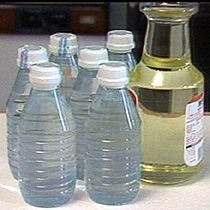2007年VOA标准英语-Scientists Study Health Risks of Plastic Ingred
搜索关注在线英语听力室公众号:tingroom,领取免费英语资料大礼包。
(单词翻译)
By Melinda SmithWashington
08 August 2007
 |
| Scientists are concerned about the health risks of an ingredient in many of the plastic containers used for food and drinks |
Bisphenol A is everywhere. BPA, as it is also called, can be found in the plastic milk bottle used to feed your baby, the cola bottle or food container you pick up for a fast food meal, the kidney dialysis machine patients need to keep them alive, and the dental sealant used to help prevent tooth decay.
A recent study in the journal Reproductive Toxicology raises concerns about adverse2 effects of BPA in fetal mice, at levels even lower than U.S. government standards permit.
The scientists say widespread exposure through food and liquid containers occurs when the chemical bonds which hold bisphenol A in the plastic degrades. BPA then leaches3 into the containers.
Frederick vom Saal, a professor of biological sciences at the University of Missouri, says he is concerned about what we absorb and then transmit to our infants. "Very low doses of this – below the amounts that are present in humans. When particularly exposure occurs in fetuses4, in fetuses and newborns, you end up with those babies eventually developing prostate cancer, breast cancer – they become hyperactive."
Kimberly Lisack is a mother who wants more information about what she feeds her baby. "I get concerned looking at a lot of the packaged baby foods. It's a lot of chemicals and things I don't know what they are."
Bisphenol A has been produced in polycarbonate plastic for decades. A statement released by the American Chemistry Council says the report is at odds5 with other international studies that say BPA levels pose no health risks to consumers.
 收听单词发音
收听单词发音 




